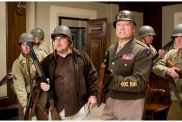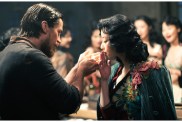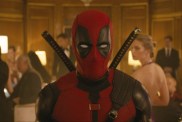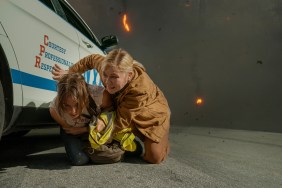His fourth film, Apocalypto, is even more of a challenge, being an action movie set during Mayan times, starring first-time actor Rudy Youngblood, and enacted entirely in the Mayan dialect of Yucatec. You gotta love and respect Gibson’s desire to try something different, but somehow, he was able to pull it off, turning a simple idea into a visionary masterpiece that exemplifies how much he’s developed as a filmmaker since making Braveheart more than eleven years ago.
A couple months back, Gibson did an extensive Q ‘n’ A out of his Icon Productions offices, but in this new exclusive interview with ComingSoon.net, conducted mere days after the movie’s opening, he talks a bit more about what he hoped to accomplish with the film and whether he feels he’s succeeded.
ComingSoon.net: You’ve said that you made this movie to “entertain, educate and lift to a higher plane of awareness.” That last one’s kind of a lofty goal, so is that a good reason to make a movie nowadays?
Mel Gibson: I think if you can do all three of those things, you’re kind of firing on all cylinders. Whether or not I actually achieved it is up to an audience member to extrapolate. From my sensibilities, I did, but those are only my perceptions.
CS: What was it about the Mayan people or that era that got you interested in trying something like this?
Gibson: Well, no, it wasn’t that. At first, I was just trying to make a chase film, but I wanted to make it a chase film that didn’t have automobiles, so I thought of a foot chase. And I thought, “Well, where would you have a foot chase? You’d have a foot chase in some place that was a long time ago. And let me see, where can that be? Oh, this is interesting. No one’s really looked at this much before. And what’s more interesting is that the civilization dates back to millennia before the Europeans arrived.” And that to me, musing on what might have happened before Europe arrivedbecause we have this conceit that history began when we got here–I thought that was interesting. Most people do it when the boats arrive, and then the fun starts, but I wanted to do it the other way around, and look what was before all that.

Gibson: Yeah, the main guy (Rudy Youngblood) had never been in front of a camera, he was like “Huh?” Some of the performers had done stuff, two or three of them, but by and large, they were fairly inexperienced. They were novices, fledglings, it was great! It was so nice because I got the opportunity to be a true mentoror a “tormentor” I’m not sure whichto impart things that I’d always thought but never really been able to impart to someone who was totally free of any kind of teaching. They didn’t even have bad habits. It was interesting to watch them grow, and to realize, “Hey, maybe I know what I’m talking about. I think that they turned in really magnificent performances, all of them, and it was in them, too. It’s not like I just imposed something on them. They did it themselves. You had to help them, they’d never done it before. It felt really good. I felt like a proud father watching a kid riding a bicycle.
CS: But going down to that alien Mexican environment to make a movie with so many inexperienced people, there must have been some worries about it working. How much time did you end up spending down there making the movie?
Gibson: A long time, longer than I had anticipated. And of course, we always think, “I’ll do this, this and this and it’ll be fine,” but of course, you come across a lot of obstacles and hurdles, and mostly, it’s about bumping into hurdles or falling over them or trying to clear them. So necessarily then it’s going to take longer than you anticipated, but it was worth it, you know? “Nothing worthwhile isn’t hard won.”
CS: Was it also the challenge this would offer you as a director that drove you to do it?
Gibson: Oh, absolutely. You’re working in a different language. You’re working with largely an inexperienced cast. You have communication barriers. You’re working in a difficult environment. You’re using a new technology in cinematography, the Genesis system, and some of the rigs are really complicated. I mean, it’s kinetic, it has to move all the time, not only has it got to move but the people in the image have to be moving at the same time as the camera’s moving. It was tricky. And you’re working with animals and children and elements. The elements were vast. It was a high degree of difficulty, but I think at the heart of it, the thing you could never ignore, is the humanity of the story and the simple aspects of the human experience, particularly as viewed vicariously in the protagonist as a young man, who has all the makings of being great but he’s never been tested. And he is severely tested. And by the end, he has to decide a lot of things, what’s important to him? He loves his forest, he loves his culture, he loves his tribe, he loves his family, and the extremes and the obstacles he has to go through in order to preserve what he loves, it’s amazing. It starts off as fear and then it becomes kind of pissed off, and he gets fearless.

Gibson: Sure, I mean someone else will probably pick that ball up. I think the indications or the earmarks of a civilization on the wane are firmly implanted in the film: conspicuous consumption, corruption in power, fear as a manipulation tool, destruction of the environment. They bring about plagues and illnesses and corruption. You know, it’s one vicious cycle and it’s all built on fear. I think the quote at the beginning of the film is indicative of what you’re seeing is something that’s eating itself from within, and it’s ripe to be conquered from without.
CS: Does it matter to you if people who see the movie don’t immediately make the connections to the modern-day world issues you’ve mentioned in past interviews?
Gibson: No, no, and that’s why I think the film works on different levels. You can take that from it if you want to look, but primarily, what you’re watching is a thriller and a really fast action roller coaster. I think that is the vehicle I put it in, so you never really get a moment to catch your breath, I hope.
CS: The film’s most impressive scene, at least to me, is when Jaguar Paw arrives in the Mayan city. It’s just an amazing scene with all the costumes and different races of people. Did you have to do a lot of research for that or did you invent some things based on what you imagined cities must have been like back then?
Gibson: Oh, no. There are many murals and clay statues of people and their dress, records of their customs, modes, looks, social morays, morals, a bible that explains what they believe in their afterlife. It was very complex, very sophisticated civilization, but it was interesting that juxtaposed against that sophistication was this barbarity, but that was true of the Roman Empire, the Greek Empire. My gosh, it’s been true of every empire.
CS: How do you think all those people of different races and cultures ended up there?
Gibson: How they came there? Well, I leave you to extrapolate that. Those cities were there, and they gathered for safety, for community, they gathered for culture, they gathered for the love of one another, and identity. Like people root for football teams, you just gravitate to something. Why do people go to cities now? They want to make something, they want to do something, they want to be something. Men have these aspirations from the year Dot, and they want to be in each other’s company and in a society and build something together. They’ll often be corrupted together. The locations were key because where they built these cities was where they were safe, and where they knew they could have an abundant food supply, and the people used to come from all around and become part of that big society.

Gibson: It does lighten things up a wee bit. It was important for me, right from the get-go. If you’re going to be in a very foreign, alien culture a long time ago and in another tongue, to have the audience identify with the characters immediately, and the best way to identify is with humor. To see that they’re different, but then to realize, “Oh, wow, they’re just the same as us!” If you get a group of men, it doesn’t matter if they’re 15 or 85 years old, when they get together, they’re all going to act like 15 year olds. That’s the way guys are, that’s my experience. You get a bunch of guys around a poker table, they’re going to goof off and insult one another and try to play practical jokes. That’s just life. And I figure hell, they always did that. People are people, no matter what era they’re from. I went that road and played the two-prong practical joke, and more serious things like lessons about fear and about community and family and loving. All these things that go into making a balanced society. That was my idea of what balance was, and then to have that interrupted by fear and disharmony was the opposite side of that coin. That was trying to show the human experience in all its facets, the dark sides of human nature and the highest sides of it, the light sides. That’s mythic storytelling, and really the structure of the story is a myth. It was absolutely necessary to be archetypal in the casting, so that you can identify these people right away. There’s the everyman, the hero, the man who’s a little bit more sensitive to his environment and to an extrasensory nature than the others, who is not quite complete, but has some growing to do. There’s the wise father. There’s the big loveable friend who’s just a great guy, and he has problems and everyone picks on him. There’s the nagging mother-in-law, there’s the innocent beautiful pregnant full-bellied wife with the child who’s just like a Madonna. You know, they’re archetypes. There’s the villains and the heroes, so that these are very clearly drawn portraits. I cast to hit it right on the head, if I could, to make it absolutely clear right off the get-go, simply because you’re dealing in elements like other cultures, other dialect.
CS: It obviously took a lot of time and patience to make this movie. You must have so many ideas, so how do you decide which one to follow through with and spend the time making into a movie?
Gibson: The one that appeals, the one you have a passion for, the one that moves the story along and moves you in some way, whether it’s emotionally or if it’s a fear that it touches or if it’s a message or something you want to say. If you can put them all together and have them flow as one presentation in the story, you’re working on multi-layers. That was really the aim I think.
CS: Originally, Touchstone Pictures was going to release the movie in the summer. After seeing, I thought it would have fit nicely alongside other summer epics. Are you still happy with their decision to release it in December?
Gibson: It was done when it was done, and I think the smartest thing when you’re finished with a picture is get it finished and put it out there. I would have preferred the summer, I think it would have fared better. It really is a big summer action film, a real popcorn movie, where the hero wins and everybody you want get their just desserts.

Gibson: No, I don’t think it’s reviews. I think it’s the way the audience reacts to it. If they react to it and they get something from it, I think that in itself and even if it’s just that they got entertained, that’s enough. If they got entertained, educated and learned something on a higher level, that’s even better. I tried to do all those three things, whether I got there or not, well that’s for them to extrapolate and maybe I’ll get some nice feedback for that sometime.
CS: But how are you able to gauge that audience reaction? Are you ever able to sneak into theatres and watch it with regular people, and if not, how will you know if the movie connected with them the way you wanted?
Gibson: Well, I haven’t snuck into any screenings or anything, but I get feedback. People honestly tell you. They’ll tell you what they thought. Even some of the reviews are very honest, even some negative things are quite honest and some negative things are disingenuous, but I got a pretty good meter for that sort of thing. You can see when someone’s just got the knife out for you or when they’re being honest. All those things add up. It’s the feedback you get from all over. I just do what I do to the best of my ability, put it out there because I want to share it, because you don’t make art for an elite. My greatest joy is to be able to share it with other people who appreciate it.
CS: You received an Oscar as a director fairly early in your career, so how important are awards to you? Is it important for a movie like this to get awards to get more people to see it?
Gibson: Well, you know, if you put a substantial investment of blood, sweat, tears and even hard cold cash into it, one always wants to recoup what you put in. I think the blood, sweat and tears part, the experience is rewarding in itself, even if it was hard. The cash aspect, well there’s no guarantee on that ever. If people like it, they come to see it, and then you have something you can show to them and they pay you. The awards, if you get accolades from your peers, that’s wonderful, that’s very flattering, and it’s feedback from them that’s great, but that’s not the ultimate goal. It really isn’t. The ultimate goal is to just make a compelling story.
Mel Gibson’s Apocalypto is now playing everywhere! To get a taste of some of those amazing action scenes, you can see a 6 1⁄2 minute sequence of Jaguar Paw being chased by an actual jaguar on You Tube.









